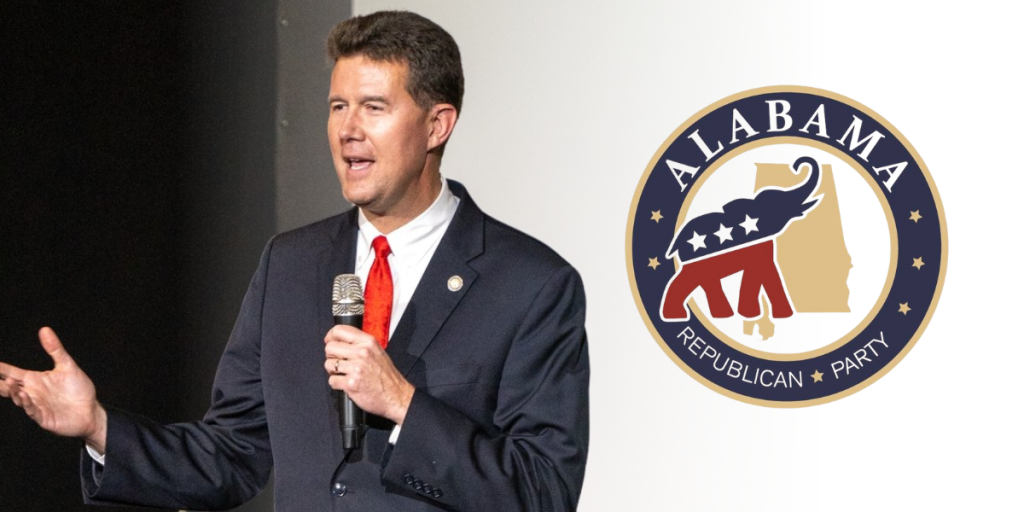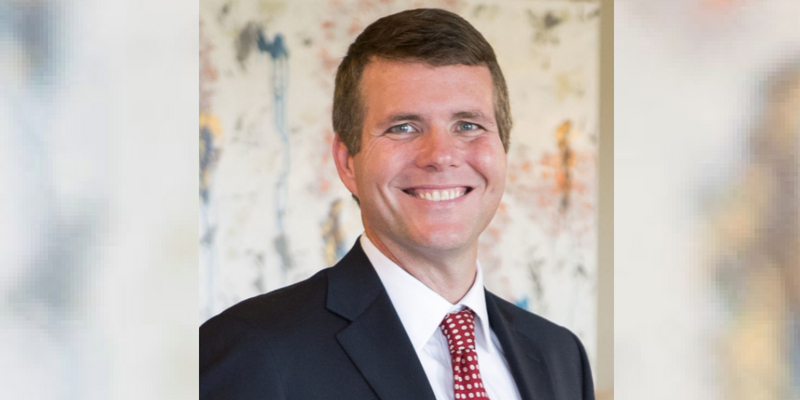State Sen. Bill Hightower, a candidate for the Republican Party’s nomination for governor, recently responded to the questionnaire prepared by the Alabama Policy Institute and Yellowhammer News. His answers are below.
POLITICAL PHILOSOPHY AND PRINCIPLES
Question: What is your political philosophy and, if elected, how would it shape the way you govern?
Hightower: My conservatism has been formed by multiple experiences, observations, & teachings. My earliest lessons were in reading National Review during the 1980’s along with conservative economic philosophy writers from the Austrian School of Economics (Hayek, Von Mises, Freidman). More recently I am an avid listener to George Mason University’s, Russ Roberts, PhD., and other conservative policy leaders.
My experience in business reinforced my conservative views as I worked in China, where private property rights are not highly valued, and Europe, where regulation and government intrusion is so massive as to be oppressive and unpredictable. Their economies somehow survive, but at times I think it miraculous they do.
My political philosophy is also shaped by my faith in God through Christianity which makes clear that we must do good unto one another, and serve one another. But I am also keenly aware that the organization of government is all too often harnessed by the powerful to take from those who have not, or to keep them in check. The later often being the case in Alabama. It is because of sin that we need government, but it is also because of sin that we need limited government. We must have limited government.
Government takes over where communities, churches, and synagogues relinquish their role to help and serve others. And because government can take from anyone, using the law to do so, it will continue to grow to the degree society allows it to do so. (The government that can give you everything you want, is the same government that can take everything you have). Because of this I believe in the principal of limited government, with a high degree of encouragement toward community solutions. There are activities the government can and should perform for the community, but these should be minimized. One of Government’s primary roles should be protecting the weak from the strong. I also believe that government should not play favorites, picking winners and losers. The tax code, governing committees, occupation boards, and all functions of government should create or enable a level playing field and not pick favorites.
Lastly, having had leadership positions in global companies which have budgets the size of Alabama, using best-in-class practices, I intend to bring those practices and expectations with me to Montgomery. This will include performance-based measurements, budget spending justification, and metrics to measure and reward progress and results.
How have you demonstrated your commitment to your political philosophy?
My voting record as an Alabama State Senator is the best demonstration of my commitment, as is the resiliency and creativity of my ideas, as seen in my Alabama-First Ideas (www.BillHightower.com).
While serving as an Alabama State Senator, I have pushed for tax reform in the form of a Flat-Tax, but also worked on development of the Fair-Tax concept for Alabama. I have successfully brought Term-Limits to the floor of the Alabama Senate for a vote, to end the cycle of cronyism and professional politicians, in our state. I have proposed budget reform in the form of un-earmarking of our state budget, to find waste, and increase spending on core state responsibilities, such as education and law enforcement (particularly the State Troopers). Additionally, I have fought for religious liberties, protecting Alabama’s much needed, and highly valued, Faith-Based Adoption services. My pro-life position has been defined by my long-term, and continued work with Save-a-Life, as well as the passage of a law making it illegal to sell baby-body parts in Alabama.
Although this is what I have done in my past, I intend to carry these same types of conservative, business-friendly, governmental reforms forward as Governor.
What is the most important role of the governor?
The Governor’s most important role is to be an effective and honorable CEO for the state. This includes advocating for the less fortunate, while empowering those who already excel towards their productive goals. As the CEO, he/she must lead Alabama toward broad improvement, enhancing our many successes even further, while breaking down the barriers to people’s liberty and upward mobility. Key barriers to success in Alabama are things such as the tax code which is riddled with $4.4 billion of perpetual special tax carveouts for special interest, with little to show of benefit to the state, a budget system which is crippled with entitlements (earmarks), which allow for little re-prioritization on important core responsibilities such as education. This budget system has been in place since the 1940’s, giving Alabama the most ear-marked budget in the USA at 93%; Michigan is next most ear-marked at 63%. No respected think-tank on state reform, recognizes Alabama as a leader in this area.
What is the most challenging social issue facing families in Alabama? Does government have a role in helping to solve that problem, and if so, what would you propose?
The most challenging issue for Alabama families is the breakup of the Alabama family. But from that comes unproductive behavior such as an increasing dependence upon opioids. The state must better control these substances without harming those who legitimately need them to overcome chronic pain. Many people are first introduced to opioids upon the removal of their wisdom-teeth. There is also not enough education regarding the threat of opioids and addiction. The state can play a role by working with the medical community on proper prescription amounts, educating the public on how and where addiction starts and ways to prevent ongoing dependence. I would also consider a mandatory reduction in the number of days an opioid prescription is given; with exceptions for those with physician certified chronic pain.
Alabama has four abortion clinics operating across the state, and Planned Parenthood has announced plans to build a new clinic in downtown Birmingham. How do you feel about these clinics and what would you do as governor about any taxpayer funds they receive?
Planned Parenthood will be defunded under my governorship. Those resources will be refocused upon Women’s Resource Centers, which focus upon the life and well-being of the whole family. They offer pre-natal care, child-raising seminars, sonograms, and other critical care elements in a healthy environment. Additionally, I will work to make adoption easy and at a lower-cost. We not only need to stop abortion, but must also care for the children, when a brave mother choses to carry their child full term.
My wife and I have worked in the pro-life movement since the 1980’s and as a State Senator I have passed such laws which make it illegal to sell baby body parts in Alabama and have written and passed a resolution condemning our junior senator in DC for his vote against the Pain Capable Abortion Bill, which would have stopped abortions at 20 weeks; the time that clinical studies have determined the baby feels the pain of the abortion.
EDUCATION
PUBLIC EDUCATION
Alabama is ranked number forty-seven on U.S. News and World Report’s list of Best States for Education, and ranked number 1 in Pre-Kindergarten quality. As far as public education reforms, there have been many suggestions for improvement including increased investment in STEM education, distance learning, and reforming teacher tenure. What reforms would you propose or support to improve public education and prepare Alabama’s children for school success and lifelong learning?
Our focus upon this has the potential to affect much more than education. My Alabama-First plan includes the introduction of certification programs into high school at a much more robust level than we see today. They will no longer need to wait until after graduation, but upon graduation will have the training they need to enter the workforce. Junior college resources (often underutilized) will be utilized to accomplish this but will be in conjunction with local market needs and driven by business requirements. Giving purpose to high school students, toward hope and a job, will keep many of them out of unproductive lifestyles as the strive to prepare for a well-paying job.
I will reinvigorate the award-winning reading program Alabama had years ago and increase funding of STEM (hands-on science & technology learning). Additionally, I will create special turn-around groups which will be mobile and can go into schools, to turn-around failing schools. Using technology through broadband, I will take teaching content and courses, previously not available in rural areas, to the student. This will broaden course availability to give each student the same advantage of learning. I will also work to shrink the level of bureaucracy in our education system to ensure more of our tax dollars reach the classroom. I have never met a teacher who doesn’t want to do a good job in preparing their students for the future. What our teachers need is support, not more administration. Education is the “doorway” out of poverty.
ALABAMA STATE BOARD OF EDUCATION
Dr. Eric Mackey was recently named Alabama’s next State Superintendent of Education. The governor serves as a voting member of the Alabama State Board of Education. What vision for Alabama do you share with the new superintendent and where do your philosophies differ? How will you prioritize Alabama’s school children in your role on the Board?
Dr. Mackey brings significant experience to this critical role. I would, however, not have selected a lobbyist to lead this core responsibility of our state, where change and innovation are required to remain competitive with the other states in the Southeastern USA. I think we need more outside perspectives, rather than insiders, in state government. I agree with Dr. Mackey on his desire to institute long-term planning for education, but want to see less administration, and more enabling of our teachers at the local level. I continue to have concerns about our ability to fully fund education without budget reform and un-earmarking.
I will prioritize Alabama’s school children in my role on the board, as I have outlined in the previous question.
SCHOOL SAFETY
The recent school shooting in Parkland, Florida reignited the discussion about school safety. President Trump has suggested arming teachers while others have argued for increased use of school resource officers and funding for mental health programs. As governor, how would you ensure the safety of Alabama’s children in public schools?
My preemptive measures would include increasing the collaboration between teachers, local police, DHR, Juvenile Hall, etc. (such as deployed in the “Helping Families Initiative” in Alabama). We know from recent incidents that some of this behavior is predictable and that often certain families have higher incidences than others. (i.e. “The Familial Concentration & Transmission of Crime”, K.M. Beaver, Florida State University, 2013). This information should be used to preemptively work for solutions.
In addition to preemptive efforts I would encourage small police centers in schools so the officers could use the school as a base for their activities. This would be similar to shopping mall’s on-sight police offices. In this way police would get to know the students, and the students would get to know the officers. This would improve the relations between the two as the students would develop relationships with the office and the public relations between them would improve.
In some cases, ex-military or certain designated individuals with appropriate training, would be able to carry a weapon, but I am not supportive of every teacher being armed. Teachers don’t need additional responsibility, they need to focus upon teaching.
SCHOOL CHOICE
In 2015, Alabama became the 43rd state to approve legislation to authorize charter schools. Many states now allow parents to transfer their child from a failing public school to a non-failing public school, to utilize education savings accounts or school vouchers, or to send students to alternative schools using tax-credit scholarships, allowing parents greater control in their child’s educational endeavors. How should school choice fit into Alabama’s education system?
Our children are required to attend schools whose boundaries and members are determined by the courts, due to the unfortunate history of racial inequality in our state. I believe the historical concept of neighborhood schools is still a good one, as it increases parental involvement and reduces the inefficiencies of travel time on the bus (not to mention the enormous costs). However, that is something which is most likely unreachable to the fullest measure, in the near term.
Parents should be given a choice to place their child in the type of school they desire. This is not a new perspective for me, but a principle. The parent has the ultimate authority; not the state. We must always respond to the parent and child needs. I am supportive of responding to the needs of parents in terms of their child’s education. If a school is not succeeding, either the school should change, or the parent should be allowed to make a change. That way, the focus is on the child.
The creation of community lead alternative schools is one way to make our education system more responsive to the needs and interests of children. It also increases community involvement, which is often a key corollary to a school’s success.
FISCAL RESPONSIBILITY
TAX CODE
In Alabama, the bottom 20% of earners pay 10% of their income in state and local taxes while the top 1% only pays 3.8% of their income in the same taxes. If elected, what would be the future of the state income tax and do you see this disparity as a problem?
Alabama’s current income tax structure is outdated, overly complex, and it hinders free-market growth. As a result, hardworking families suffer.
More than 25 states across the nation have embarked on significant tax reform in the last few years. It is apparent that each of them realizes they are in a competition for jobs and growth. By improving their tax policies, they create a business and family-friendly environment which lends itself to prosperity for those who live and do business there.
But here in Alabama, special interests and career politicians have spent years rigging the tax code with special interest tax carve-outs. I want to make Alabama’s tax code simple, low, and effective in order to compete with neighboring states. In my short time in Montgomery, I have vigorously fought for tax reform in our state. Why? Because I know we can do better.
As Governor, I will promote legislation that would create a flat tax (or alternatively a fair tax) for all individuals. This will lessen the complexity of filing your taxes, saving many families an average of $300 per year. It would also have a much more generous exemption for low income families and retirees. I believe the best way to attract new businesses and create jobs is to radically change our tax code so it’s fairer and flatter.
STATE AND LOCAL TAXES
According to the Institute for Taxation and Economic Policy, Alabama boasts the 12th most regressive state and local tax system in the nation. One contributor to this ranking is our combined 9% grocery tax (only four states tax groceries more than Alabama). In 2017, Governor Bentley proposed decreasing the grocery tax by 4%. If you are elected, would you suggest changes to the grocery tax?
This is not a binary decision over one item (i.e. to have, or not to have a grocery tax), therefore all elements of our tax code should be considered, such as the Flat Tax for an income tax along with the grocery tax. I would lower or eliminate the Grocery Tax if other tax reform measures could be achieved. I am especially sensitive to our significant agricultural community and realize that high grocery taxes make their products less competitive in our own state.
INFRASTRUCTURE INVESTMENT
US News ranks Alabama’s roads and bridges as the 16th and 21st best in the country, respectively. Even so, every neighbor of ours—except Mississippi—has roads and bridges that rank in the top 10. Alabama also ranks 45th in terms of broadband access. If elected, what would you prioritize as the most important infrastructure investment projects, and what innovative options would you propose to fund such projects?
The roads and infrastructure of Alabama are in desperate need of repair. I have always taken the position that we need to find ways to fund these repairs without raising taxes. As Governor, I will propose legislation to:
- Sell and exchange our large inventory of un-used lands & buildings owned by the state, to create a funding mechanism to begin repairing our roads. This will include selling dormant state land as well as utilizing creative business mechanisms such as sale-lease-back. Some of America’s greatest companies utilize this method, so why shouldn’t we? The state should not be holding onto dormant buildings and land, while expecting you to pay more taxes. Sell the land, build the roads.
- Privatize and streamline the Department of Transportation to save the state millions of dollars and redirect those resources to pay for infrastructure improvements.
- Create an Alabama Road and Bridge Commission to make the state government more responsive to local needs. Presently, road building is driven by political favors and not sound infrastructure planning cycles. My plan will enhance commerce, save lives, and address community needs in a prioritized manner. It will also ensure that long-term construction plans are predictable and steady, so Alabama’s road and bridge builders can build, equip and maintain their staff, which holds tremendous institutional knowledge. This will improve our roads and help job growth.
- Extend the period of use of currently lightly-used state fleet cars to create additional capital to invest in road improvement.
- Commission a High-Speed Rail Study Commission to explore the feasibility of connecting our major cities. This will increase tourism from the North Alabama mountains to the sunny coast, assist lower income households, and increase the linkage between major cities of the Southeast. The Southeastern United States is a powerful economic resource, and we need to continue to build on our past success.
- Recognize that technology is rapidly changing how we view and utilize transportation, and plan Alabama’s future with that in mind. Alabama will be a leader in technology adoption, improving the quality of life and decreasing harmful emissions in our state.
STATE-RUN LOTTERY
Most states resort to installing a state-run lottery to increase revenue and pay for government projects. Do you support a lottery to solve the state’s fiscal woes? Why or why not?
I am not an advocate of the lottery for Alabama for a number of reasons.
1. This is not an optimal way to fund state government. I do not support this alternative because it doesn’t solve the state’s financial problems. In the past few years 20 states have had budgetary crisis due to a lack of funding. 19 of those states have a lottery. It didn’t solve their problem and it won’t solve ours. We need budget reform.
2. History shows that the promises made by people who say the lottery will bring in substantial revenue are never correct. The shortfall in expected revenue is then used as an excuse to expand forms of gambling in a state. After its initial limited introduction, because it doesn’t produce the revenues promised, the advocates then expand the gaming beyond the level with which anyone is comfortable. It eventually begins to run the state; especially through the wealthy gamming lobbyists who begin to walk the halls the State House.
3. The marketing target for the gambling industry is largely the minority population. Is that the right approach for those less fortunate? I think not.
Before any new revenues are created by an involuntary or voluntary tax (such as a lottery) I will require budget reform. The core problem is a budget whose priorities were set in the 1940’s, with entitlement programs (earmarks). If progress is made on eliminating the waste and fraud of our current budgetary system, then I can with good conscience have a substantial discussion about revenue. Otherwise, we are only throwing money at a problem, and not dealing with the core issue; budget system for the state which is admired by no one.
THE RIGHT TO WORK
JOB CREATION
The Census Bureau suggests that Georgia, Florida, and Tennessee are creating more jobs than Alabama. As governor, how would you foster job creation that rivals our neighbors to the north, east, and south?
I am the first candidate to identify this problem (in addition to the fact that those state’s growing faster than Alabama) and develop a plan to deal with it. Until we solve the core problems of our state, we will not grow. Those high priority core problems are:
1. A tax code which picks favorites and provides tax carve-outs without any return, or expected benchmark, to the state. That is why I want to reform the tax code by implementing the Flat Tax (of Fair Tax) concept. Alabama’s current income tax structure is outdated, overly complex, and it hinders free-market growth. As a result, hardworking families suffer.
More than 25 states across the nation have embarked on significant tax reform in the last few years. It is apparent that each of them realize they are in a competition for jobs and growth. By improving their tax policies, they create a business and family-friendly environment which lends itself to prosperity for those who live and do business there.
But here in Alabama, special interests and career politicians have spent years rigging the tax code with special interest tax carve-outs.
I want to make Alabama’s tax code simple, low, and effective in order to compete with neighboring states. In my short time in Montgomery, I have vigorously fought for tax reform in our state. Why? Because I know we can do better.
As Governor, I will promote legislation that would create a flat tax (or alternatively a fair tax) for all individuals. This will lessen the complexity of filing your taxes, saving many families an average of $300 per year. I believe the best way to attract new businesses and create jobs is to radically change our tax code so it’s fairer and flatter.
2. State Budget Earmarking (which is an entitlement program similar to the Federal Level) which promotes waste and abuse. Budget earmarks are a serious threat to Alabama’s future. In fact, as much as 93 cents of every dollar in Alabama’s state budget is already spent before our leaders even make a budgeting decision (The average amount of earmarking in the budgets of other states is less than 25%)[1]. And shamefully, Alabama leads the country as the state with the most earmarked budget. This is wrong, and it has to end.
Without the flexibility of re-prioritizing the budget, we cannot sufficiently fund core government responsibilities such as Education or our State Troopers. Yet, this is how the career politicians in Montgomery manage the state budget. The current earmarks reflect priorities that were set decades ago, and they are a huge reason why our taxes have been increased.
No other state in the nation has a budget like this — for good reason.
As Governor, I will push for legislation that bans all earmarked spending. It’s not just the right thing to do, it also will allow you to hold your elected leaders more accountable. And with no earmarks in the budget, we will be able to increase efficiency and better determine which essential programs should receive funding.
3. As a businessman, I have built a career helping businesses grow and prosper, both nationally and internationally.I have worked firsthand with states and business to move and relocate operations where it makes the most sense for all of those involved. I intend to take that experience to the governor’s office. I know what businesses are looking for and know what we need to do to make Alabama the first choice for businesses.
To emphasize the strategic importance of the job-growth effort, as governor, I will make Workforce Development a cabinet level position. This role will work closely with high schools, community colleges, and universities to meet the needs of Alabama businesses. I will also propose legislation to make Alabama more competitive with other southern states — including tax reform and zero-based budgeting.
I want all companies nationally and internationally to know that “Alabama is Open for Business.”
4. The state of Alabama needs to do a better job helping parents prepare children to enter the workplace and give them the tools they need to succeed.
Not every student has the desire to go to college, so why does the state continue a one-size-fits-all approach to education? I believe our education system should be focused on developing each child’s God-given talents, instead of simply assuming everyone wants a four-year college degree.
As Governor, I will propose legislation to:
1. Create a dual track diploma system in our high schools so students can continue studying liberal arts in preparation for college, or they can work toward a vocational track that teaches them real hands-on skills, so they can enter the workplace upon graduation.
2. Improve distance learning capabilities at our two-year universities and connect them with our high schools to teach specialized courses for dual enrollment or vocational training for certification programs. I want to work with local businesses – that desperately need skilled workers – to develop these programs.
3. Shrink the level of bureaucracy in our education system to ensure more of our tax dollars reach the classroom. I have never met a teacher who doesn’t want to do a good job in preparing their students for the future. What our teachers need is support, not more administration. This support includes such things as expanded STEM programs, mobile material experts who support teaching, and more nurses in the schools to free the teachers up so they can focus upon what they do best… teach.
ROLE OF LABOR
Alabama is a right-to-work state. In your opinion, what is the proper role of organized labor and should Alabama remain a right-to-work state?
It is imperative that Alabama remain a right-to-work state. This is a key reason we have been able to recruit many fine companies to Alabama. Efforts to organize the state are often efforts by northern state’s labor unions to make Alabama less competitive for jobs, so they can protect their own.
In my experience as an executive, I have learned that non-organized companies that are threatened by “organized” labor often do not treat their employees with dignity and respect. This is not always the case, but in my experience, it is often the case.
Alabama companies shouldn’t need to be “organized” to accomplish their strategic goals, which includes a workforce that is treated and paid well, and I would work to keep it that way.
OCCUPATIONAL LICENSING IN ALABAMA
The state of Alabama licenses 151 different occupations and over 20% of Alabama workers need a license to work. If elected, how would address these regulations—regulations that both the Obama and Trump administrations have regarded as problematic?
Montgomery has been a place where industries and companies come to pass laws to give them a market advantage, while oppressing or locking out others. This should stop. Labor must be mobile and flexible for Alabama to succeed. Doing so will help the minorities, and less fortunate of our state, to begin a career and also enable small business to flourish.
CRIMINAL JUSTICE
OPIOID EPIDEMIC
According to the CDC, Alabama is the state highest-prescribed with opioids, with more prescriptions than people. Opioids are the main driver of overdose deaths and, in 2016, 756 Alabamians died from drug overdoses. As governor, how would you tackle Alabama’s share of this national crisis?
The opioid crisis is ruining lives across Alabama. It’s impacting our neighborhoods and our families — and it’s not a partisan issue. Quite simply, it’s a public health crisis.
Our leaders in Montgomery should be working urgently to help local communities take action.
As Governor, I will immediately declare the opioid crisis a statewide public health emergency. This critical step alone will increase coordination among state and local governments, law enforcement, medical professionals, first responders, and community organizations in finding solutions that save lives.
I will propose a one-time funding package that ensures first responders have access to the lifesaving drug NARCAN. I will also reduce the quantity of prescriptions for all, except the exceptions who have physician certified chronic pain issues.
CRIME PREVENTION
Alabama has the third highest murder rate in the country. As governor, how would you address crime and what policies, specifically, would you propose?
While prosperity and lower unemployment will help in this problem, it will not totally solve the problem. The communities themselves must want a change and law enforcement is a partner in that effort. As governor I would first ensure that our amazing State Troopers are funded, properly staffed with people, and armed with the latest technology. An increase in law enforcement expenditures as a priority, will help. But law enforcement cannot be successful unless the community wants it to be successful. As Governor I would work with local community leaders to introduce policies and procedures which communicate the value of life and the benefits of a peaceful and caring community.
PRISON REFORMS
Alabama has received national attention for the state of its prisons and a federal judge recently called inmate care “horrendously inadequate”. How would you address this issue, and do you support the use of private prisons?
I will approach this in the most cost-effective and positive way possible. I will support mental health efforts and a further segmentation of the prison population in order to treat each situation more specifically. The mega prison concept proposed by Bentley was not politically feasible, so we must attend to our existing sites, building workable structures that enable the safety of the staff, while also permitting access by the community and family members, to enable re-integration, which will lower recidivism. We must enable the prisoners to re-enter society and to be successful. Our churches and communities are vital to its success.
CIVIL ASSET FORFEITURE
Some states are eliminating provisions that allow police to seize property without securing a criminal conviction. Do you support the use of civil asset forfeiture by law enforcement and the provision that allows agencies to keep the proceeds of seized property? Why or why not?
Civil asset forfeiture helps law enforcement to capture the bad “actors” of our society. It is not an un-checked process in our law enforcement and criminal justice system. For instance, the DA must approve such actions by law enforcement and there are reasonable tests in place to determine this. I would support measures which require law enforcement to report – improving transparency – but I am not yet ready to eliminate law enforcement’s ability to use this as a tool in their arsenal against crime.
Note: Answers to these questions were largely taken from Bill Hightower’s Alabama-First ideas, which he personally drafted in 2017. Alabama-First as well as other information, can be found at: www.BillHightower.com.
[1] As quoted in The Guide to the Issues: State Budget Earmarks by API referencing Arturo Pérez, National Conference of State Legislatures, Earmarking State Taxes 5 (2008), http://www.ncsl.org/documents/fiscal/earmarking-state-taxes.pdf [http://perma.cc/57N6-GKDV].
The Alabama Policy Institute, headquartered in Birmingham, is an independent, nonpartisan, nonprofit research and educational organization dedicated to strengthening free enterprise, defending limited government, and championing strong families. To learn more about their work and how you can help, please visit alabamapolicy.org.













